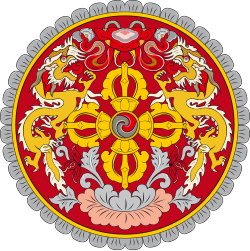 |
|---|
National Council elections were held in Bhutan on 23 April 2013. [1] All candidates ran as independents, as National Council members were prohibited from belonging to a political party. [2]
 |
|---|
National Council elections were held in Bhutan on 23 April 2013. [1] All candidates ran as independents, as National Council members were prohibited from belonging to a political party. [2]
The 20 members of the National Council were elected in single-member constituencies equivalent to the country's twenty Dzongkhags. A further five members were appointed by the Druk Gyalpo. [2]
Candidates had to register by 31 March, whilst the campaigning period lasted from 1 to 21 April. [1] A total of 67 candidates registered to run in the election, although the Dagana and Trashigang dzongkhags had only one candidate each. [3] In those dzongkhags voters were given the choice of voting against the only candidate. [4]
Election day was a public holiday, and the country's borders were closed for the day. [5]
| Dzongkhag | Candidate | Votes | % | Notes |
|---|---|---|---|---|
| Bumthang | Nima | 2,264 | 48.41 | Elected |
| Sonam Tenzin | 971 | 20.76 | ||
| Rinchen Phuntsho | 951 | 20.33 | ||
| Tshewang Jurmi | 491 | 10.50 | ||
| Chukha | Pema Tenzin | 6,995 | 65.53 | Elected |
| Tshewang Lhamo | 3,680 | 34.47 | ||
| Dagana | Sonam Dorji | 7,989 | 81.83 | Elected |
| Against | 1,774 | 18.17 | ||
| Gasa | Sangay Khandu | 603 | 44.60 | Elected |
| Tenzin | 407 | 30.10 | ||
| Yeshey Dorji | 342 | 25.30 | ||
| Haa | Tshering Dorji | 1,866 | 51.68 | Elected |
| Khandu Wangchuk | 634 | 17.56 | ||
| Choda Jamtsho | 631 | 17.47 | ||
| Tenzin Norbu | 480 | 13.29 | ||
| Lhuntse | Tempa Dorji | 3,193 | 60.08 | Elected |
| Rinzin Rinzin | 2,122 | 39.92 | ||
| Mongar | Sonam Wangchuk | 4,821 | 38.13 | Elected |
| Naichu | 4,484 | 35.47 | ||
| Tshering Wangchen | 3,338 | 26.40 | ||
| Paro | Kaka Tshering | 2,422 | 23.73 | Elected |
| Kinley Dorji | 2,075 | 20.33 | ||
| Ugyen Tshering | 2,071 | 20.29 | ||
| Sonam Wangchuk | 2,056 | 20.14 | ||
| Tshewang Norbu | 1,583 | 15.51 | ||
| Pemagatshel | Jigmi Rinzin | 5,184 | 57.78 | Elected |
| Pema Wangchuk | 2,103 | 23.44 | ||
| Sherab Jamtsho | 1,685 | 18.78 | ||
| Punakha | Rinzin Dorji | 3,449 | 55.51 | Elected |
| Namgay Dorji | 2,764 | 44.49 | ||
| Samdrup Jongkhar | Jigme Wangchuk | 5,213 | 55.28 | Re-elected |
| Kinga Dorji | 2,434 | 25.81 | ||
| Sangay Lhendup | 1,784 | 18.92 | ||
| Samtse | Sangay Khandu | 9,907 | 48.56 | Elected |
| Dhan Kumar Ghalley | 4,595 | 22.52 | ||
| Chungdu Tshering | 1,944 | 9.53 | ||
| Chhatrapati Phuyel | 1,363 | 6.68 | ||
| Ganesh Ghimiray | 912 | 4.47 | ||
| Kharananda Dhakal | 906 | 4.44 | ||
| Narayan Dahal | 775 | 3.80 | ||
| Sarpang | Dhan Bdr. Monger | 4,131 | 32.89 | Elected |
| Sonam Doekar | 3,855 | 30.69 | ||
| Rangu Pati Suberi | 1,674 | 13.33 | ||
| Anand Rai | 1,488 | 11.85 | ||
| Dhan Kumar Basnet | 1,412 | 11.24 | ||
| Thimphu | Nima Gyeltshen | 2,250 | 41.78 | Elected |
| Tshering | 1,624 | 30.16 | ||
| Tshering Tashi | 1,511 | 28.06 | ||
| Trashigang | Sonam Kinga | 11,229 | 81.20 | Re-elected |
| Against | 2,600 | 18.80 | ||
| Trashiyangtse | Tashi Phuntsho | 3,226 | 58.51 | Elected |
| Karma Gyeltshen | 2,288 | 41.49 | ||
| Trongsa | Tharchen | 2,083 | 47.15 | Elected |
| Tashi Samdrup | 1,629 | 36.87 | ||
| Jagar Dorji | 706 | 15.98 | ||
| Tsirang | Kamal Bahadur Gurung | 2,381 | 24.40 | Elected |
| Passang Thingh Tamang | 2,011 | 20.61 | ||
| Shyam Basnet | 1,920 | 19.68 | ||
| Novin Darlami | 1,664 | 17.05 | ||
| Sangay Tamang | 1,305 | 13.37 | ||
| Justin Gurung | 477 | 4.89 | ||
| Wangdue Phodrang | Tashi Dorji | 5,848 | 57.84 | Elected |
| Sonam Yangchen | 3,540 | 35.01 | ||
| Chado Namgyal | 723 | 7.15 | ||
| Zhemgang | Pema Dakpa | 2,413 | 35.92 | Elected |
| Yeshi Tshomo | 1,219 | 18.15 | ||
| Dorji Kadin | 1,209 | 18.00 | ||
| Ugyen Chophel | 968 | 14.41 | ||
| Pema Lhamo | 909 | 13.53 | ||
| Total | 171,544 | 100 | ||
| Registered voters/turnout | 379,819 | 45.16 | ||
| Source: Election Commission of Bhutan [4] [6] | ||||
Following the election Druk Gyalpo Jigme Khesar Namgyel Wangchuck appointed Dasho Karma Yezer Raydi, Kuenlay Tshering, Karma Damcho Nidup, Tashi Wangmo and Tashi Wangyal to the Council. [7]